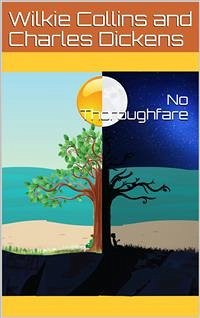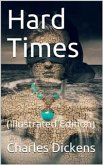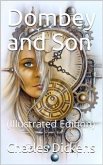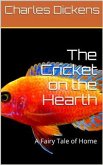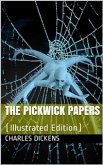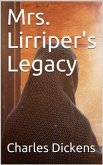No Thoroughfare is a stage play and novel by Charles Dickens and Wilkie Collins, both released in December 1867.
In 1867 Charles Dickens and Wilkie Collins collaborated to produce a stage play titled No Thoroughfare: A Drama: In Five Acts. The two had previously collaborated on the play The Frozen Deep. This was the last stage production to be associated with Dickens, who died in June 1870. The play opened at the Adelphi Theatre on 26 December 1867.
The story contains crafted descriptions, well-drawn and diverse characters, eerie and exotic backgrounds, mystery, semi-concealed identities, brinkmanship with death, romance, the eventual triumph of Good over Evil, and many other elements expected in classic Dickens.
Two boys from the Foundling Hospital are given the same name, (Walter Wilding), with disastrous consequences in adulthood. After the death of one – now a proprietor of a wine merchant's company – the executors, to right the wrong, are commissioned to find a missing heir. Their quest takes them from wine cellars in the City of London to the sunshine of the Mediterranean – across the Alps in winter. Danger and treachery would prevail were it not for the courage of the heroine, Marguerite, and a faithful company servant.
In 1867 Charles Dickens and Wilkie Collins collaborated to produce a stage play titled No Thoroughfare: A Drama: In Five Acts. The two had previously collaborated on the play The Frozen Deep. This was the last stage production to be associated with Dickens, who died in June 1870. The play opened at the Adelphi Theatre on 26 December 1867.
The story contains crafted descriptions, well-drawn and diverse characters, eerie and exotic backgrounds, mystery, semi-concealed identities, brinkmanship with death, romance, the eventual triumph of Good over Evil, and many other elements expected in classic Dickens.
Two boys from the Foundling Hospital are given the same name, (Walter Wilding), with disastrous consequences in adulthood. After the death of one – now a proprietor of a wine merchant's company – the executors, to right the wrong, are commissioned to find a missing heir. Their quest takes them from wine cellars in the City of London to the sunshine of the Mediterranean – across the Alps in winter. Danger and treachery would prevail were it not for the courage of the heroine, Marguerite, and a faithful company servant.

